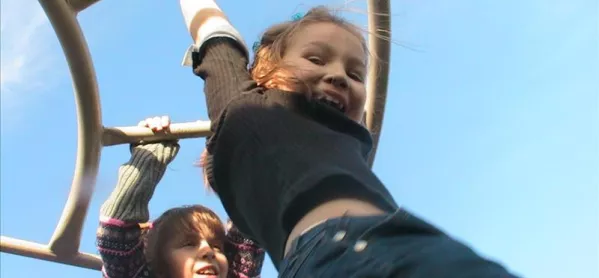Special education - Fair play

Accommodating pupils with a range of special needs at the same time is one of the major challenges faced by SEN schools. Everyday teaching tasks or getting the environment right for play become much more demanding when pupils have varying degrees of learning and physical abilities.
Highfield School was the first in its area to achieve specialist status and now caters for 150 pupils from Wakefield, Leeds and Dewsbury areas. It takes pupils with moderate and severe learning difficulties, autistic spectrum conditions, emotional, social and behavioural difficulties, sensory impairments and physical disabilities and often combinations of these conditions.
So how has the school managed to come up with an environment that enables children with such varying levels of specialist needs to play together?
“Differentiation is vital and each child’s needs are specifically identified,” says Ann Shepherd, assistant headteacher. “But we also ensure that pupils have similar opportunities and participate in the same activities. If they feel fully included and they can participate in all aspects of the school, they feel much happier.”
A wildlife conservation area near the school has been developed to accomodate children who are fully sighted, and partially and completely visually impaired. Pupils helped to cultivate a woodland trail and maintain the garden, which is also used by other members of the community. Two of the pupils achieved joint third place in the national Blind Gardener of the Year competition in 2008. Liam, who is partially sighted and has severe epilepsy, and Cory, who is blind and has attention deficit disorder, worked with their classmates on beds of plants and shrubs.
Encouraging play and social interaction between children with varying degrees of special needs is beneficial but can be a challenge. Dave Brady, design director of Sutcliffe Play, which designed and built the play equipment, became a governor of the school to better understand its needs. The final result is a playground that all the children can enjoy that also provides support for less able-bodied pupils.
“The children absolutely adore the swings and climbing frame,” says Ann, “and the equipment enables them to be independent, developing their confidence. It simulates physical balance and weight shifting. In some of the games they have to support each other and this makes the pupils think of others rather than just themselves.”
Alan Spalding, head of Highfield, believes the playground is vital for the pupils. “Our senses are important; they tell us about our surroundings and they influence our reactions. In time they mould our personality,” he says. “We wished to stimulate our pupils’ senses and develop their individual gross and fine motor skills - and have fun.” The playground is also used for lesson activities in subjects such as science, maths and personal and social development.
Ann recognises that preparing pupils for life after school is one of the most pressing requirements for SEN schools. “For a lot of pupils, the transition is hard,” she says. “But the support they get here from staff, partner agencies and governing bodies is amazing. (The opportunities) help make the children feel important, give them ownership and fundamentally build confidence, all of which prepares them for living in their community.”
INCLUSIVE PLAY IN SEN SCHOOLS
- Include multi-sensory environments. Highfield School’s garden has a variety of smells and textures.
- Identify each child’s needs and make sure they are met.
- Change activities to revive pupils’ interest as well as teachers’.
- Involve the wider community and other schools.
- Make lessons cross-curricular.
Keep reading for just £1 per month
You've reached your limit of free articles this month. Subscribe for £1 per month for three months and get:
- Unlimited access to all Tes magazine content
- Exclusive subscriber-only stories
- Award-winning email newsletters


